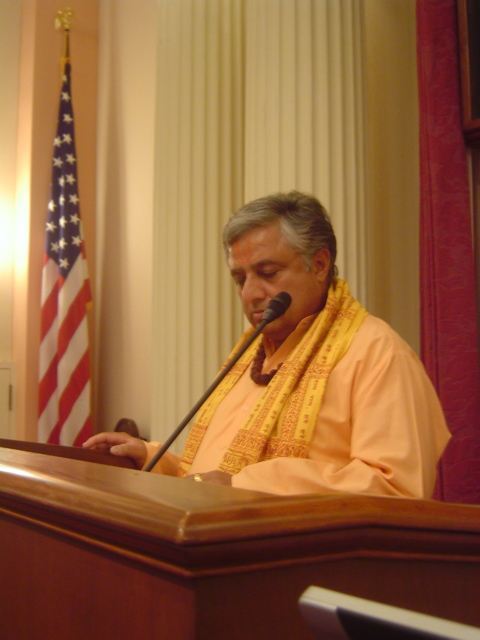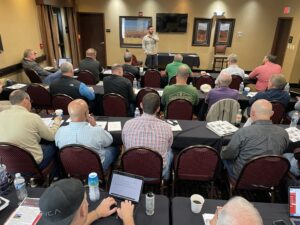
NASHVILLE, Tenn. (BP)–A Hindu chaplain who now has led prayers in the U.S. Senate, the California Senate and the Nevada legislature may reflect the growing influence of Hinduism in the United States spurred in part by America’s technological ties with India, an interfaith evangelism expert said.
Rajan Zed, director of interfaith relations at a Hindu temple in Reno, Nev., became the first Hindu to offer an official prayer in the U.S. Senate in July after praying in the Nevada State Assembly and the Nevada Senate earlier this year. On Aug. 27, he became the first Hindu to pray at the California Senate.
N SRK Ravi, director of the North American Mission Board’s Evangelism Response Center and a former Hindu, told Baptist Press he had not heard of Zed before the chaplain prayed in the U.S. Senate and said Zed “has been a minor figure among the Indian Hindu community until recently.”
But now Zed’s followers are growing rapidly and a group called Friends of Rajan Zed has been established in India with goals of “working to maximize human potential, promoting and preserving peace and praying for humankind,” according to the Reno Gazette-Journal Aug. 26. The group has asked Nevada’s governor to declare July 12, the day Zed recited a prayer at the U.S. Senate, as Rajan Zed Day.
NAMB’s Ravi said he’s not sure whether Zed has a clear religious agenda behind leading prayers at American government institutions, but Ravi does believe Zed is using those open doors to show the growing Indian Hindu presence in the United States.
“Since the Johnson administration opened doors to non-European immigrants, Indians — especially Hindu Indians — immigrated in large numbers,” Ravi told BP. “Current estimates range from 2.2 to 3 million Hindus in the United States. Those who come from India are the cream of the crop of Indian society, and they are highly educated and motivated individuals.
“Their influence is felt in the high-tech industry, hotel industry, financial field and medical field,” Ravi said. “For the most part, immigrant Indian Hindus are nominal in their faith when they are in India; however, when they come to a new nation they do practice their faith devotedly.”
The United States is now home to more than 800 Hindu temples, Ravi said, and this summer a $19 million Hindu temple was dedicated in an Atlanta suburb.
“Second- and third-generation [Americans with ties to India] are not religious; they are becoming more materialists,” Ravi added.
Hinduism has been an influential religious philosophy throughout the world for centuries, Ravi noted, and now it is influencing the West “with its undefinable and slippery philosophical thought through New Age, yoga, reincarnation and hundreds of other religious thoughts.” Many western cults are influenced by Hindu philosophical thought, he said.
Zed, the Hindu chaplain, told Baptist Press his purpose in reciting prayers at senate sessions was to initiate dialogue between traditionally Christian leaders and their constituents who subscribe to different religions.
“Although many of us won’t accept it, religion is a complex component of our lives and it encompasses much more than our own particular tradition or personal experience,” Zed said. “We all must take religion very seriously as it is the most powerful force. The challenge today is to seek unity that celebrates diversity….
“All of us are looking for the truth. Dialogue brings us mutual enrichment. We may learn from each other as we are headed in the same direction. We should at least cooperate in the common causes of peace, human development, love, and respect for others,” Zed said, adding that Mahatma Gandhi claimed “God has no religion.”
But Ravi said Zed’s prayers at American institutions of government conflict with the intentions of the nation’s founders.
“I believe that all the founding fathers of this country were Judeo-Christian thinkers,” Ravi said. “They intended to pray to the monotheistic God as revealed in the Holy Bible, not to any god who was revealed in other religious books.”
The Pledge of Allegiance and U.S. currency bearing the phrase “In God We Trust” are two examples of faith in a monotheistic God held by the nation’s founders, he said.
“The god Rajan Zed represented is a different god,” Ravi told BP. “The prayers he offered are not to the God of the Bible. The god Rajan Zed represented is powerless. He cannot forgive sin, therefore he leaves the sinner to the fate of karma and reincarnation and endless human suffering.
“The holy water he sprinkled on the Senate floor was from the land of India, which means the god is limited to a specific region of the universe,” Ravi added. “He is not the God of the universe. What is next? Prayers to Satan? Pagans? Dead spirits? Prayers to atheists?”
Ravi pointed to Psalm 33:12, which says, “Blessed is the nation whose God is the Lord; and the people whom He hath chosen for His own inheritance,” and he said America’s religious freedom is based on true Christian values, not on contradictory religious value systems.
In India, Ravi said, he was born into a family of considerable wealth and a caste status second only to priests. At the age of 3, he was stricken with polio. His family spent money on medicine and on sacrifices to Hindu gods, he said, but nothing helped. They concluded that his affliction must be because of bad karma, which meant he was suffering for the deeds of a past life.
“I grew bitter and angry about my condition,” Ravi recounted. “One day I was sitting on a bench and a Christian man dressed in a white robe sat beside me and shared with me that God really loves me and how He paid for my sins. All of my life I had been told that I am paying for my past sins.”
Fourteen months after the encounter with the Christian man, Ravi accepted Christ and his sins were removed.
“What a freedom it was, and still is today,” he said. “The guilt of karmic debt was gone, and I saw the reincarnation as a total lie.”
Among the facts about Hinduism:
— It’s the third-largest religion after Christianity and Islam, with nearly 700 million adherents, or about 10.6 percent of the world’s population, according to the International Mission Board’s global research department.
— Hinduism has no single creed and recognizes no final truth, Ravi wrote at www.4truth.net, an apologetics website at NAMB. At its core, Hinduism has a pagan background in which the forces of nature and human heroes are personified as gods and goddesses which are worshipped with prayers and offerings, Ravi recounted. He noted that Hindus claim there are 330 million gods.
— Most Hindus worship daily an image of their chosen deity, and worship is primarily individualistic rather than congregational.
— Brahman is the one impersonal, ultimate but unknowable spiritual reality, Ravi said. According to Hinduism, Brahman alone exists and everything ultimately is an illusion.
— Reincarnations are required so that the soul can be liberated from the body, Hindus believe, and an individual’s present life is determined by the law of karma, which includes actions, words and thoughts from previous lifetimes. Rebirths are experienced until karma has been removed to allow the soul’s re-absorption into Brahman, Ravi explained.
— As Christians attempt to share Christ with Hindus, Ravi said they should stress the uniqueness of Jesus Christ as God’s revelation of Himself. It is also important to emphasize the necessity of following Jesus to the exclusion of all other deities, he said. And believers should communicate that their assurance of salvation is derived from God’s grace and not from their own good works.
–30–
Erin Roach is a staff writer for Baptist Press.
















